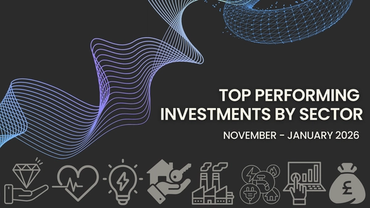How to incorporate ESG into your portfolio
1 Nov, 2022
These days it seems like the word 'ESG' is floating around everywhere, often flanked by 'sustainable', 'green', 'impact', and other confusing and wishy-washy terms. So what does it really mean? What's all the fuss about? And how can you use ETFs to get involved?

What is ESG?
ESG - which stands for Environment, Social and Governance – is an umbrella term for a variety of standards often used to understand a company's impact on the planet, on people, and how fair and transparent its operations are.
It's an increasingly popular method of screening for sustainable investments to add to your portfolio, or alternatively, for investments that you'd rather not have in your holdings if you find that they don't match your personal values.
Let's break it down.
The ‘E’ - for Environment - is the impact the company and/or its suppliers have on the environment. If you're concerned about the environment, you might want to check whether the companies you’re investing in aren’t:
Heavily investing or reliant on fossil fuels such as oil, gas and coal
Practicing or linked to unsustainable agriculture practices, like factory farming
Linked to suppliers or other companies that are contributing towards deforestation
Involved in activities which damage or compromise water supplies for people and wildlife
The ‘S’ - for Social - is the impact the company and/or its suppliers have on people (including its own employees as well as those affected by its activities) and wider society. If this matters to you, you may want to check the following for the companies you're investing in:
Are the activities of the company and/or its suppliers linked to human rights abuses?
Is the company inclusive and working towards increasing diversity?
How does the company give back to communities?
What sort of charity work has it recently been involved in?
The ‘G’ - for Governance - is how the company is run and conducts itself. If you're interested in a company's compliance, transparency, and accountability, you might want to find the answers to the following questions:
What’s the CEO’s reputation?
Do employees get any seats at board meetings?
Is, or has, the company been involved in any political lobbying?
What do employees, customers and suppliers think of the company?
This is not a prescriptive nor exhaustive list, just an example of the kind of questions you may want the answers to when trying to assess how sustainable a company is.
How can you use ETFs for ESG investing?
ETFs provide a fantastic opportunity to access a basket of equities all bundled up for you, so you don't have to fish around for dozens of individuals stocks, and nowadays there's no shortage of choices when it comes to ETFs with a focus on ESG.
You might see the terms 'ethical', 'impact' and 'sustainable' used to describe types of ESG-focused ETFs. Here's a breakdown of what each one means and which type might suit your needs.
Ethical ETFs
These ETFs actively exclude what many consider 'unethical' or 'controversial' activities, while aiming to generate long-term financial returns. For example, an Ethical ETF might avoid companies that are involved in or invest in alcohol or gambling products. But this doesn't necessarily mean that your money will go to causes that aim to protect people and planet; it just excludes the nasties.
So if you're more concerned about putting your money towards good causes, rather than just keeping it away from the nasties, then an Impact ETF might be a better fit for you.
Impact ETFs
Impact ETFs aim to generate long-term financial returns while also investing your money towards good causes, such as improving access to affordable healthcare in a developing country, supporting conservation programmes in areas experiencing a significant loss of biodiversity, and improving global food security.
If you want to focus on the environment and sectors like renewable energy projects, you may want to choose a Sustainable ETF.
Sustainable ETFs
These ETFs, while similar to Impact ETFs, have a specific focus on environmental activities. They aim to generate long-term financial returns while investing your money into companies which are helping to protect and improve the environment, such as renewable energy projects like wind power, geothermal or solar energy, air pollution mitigation, and improving waste management.
You can read more about the different types of sustainable investing over on our Sustainable Investing Hub.
How to incorporate ESG into your portfolio
ETFs focusing on ESG and sustainability are supremely popular at the moment, but if you're unfamiliar with the topic or you're just not quite sure where to start, here's a 3-step checklist to help get you started.
1. Work out what's most important to you
Step one is to identify what your priorities are. For example, if you want to exclude the conventional nasties - like tobacco and fossil fuels - then you might want to focus on Ethical ETFs which exclude so-called 'sin stocks'. Or if you're dedicated to putting your money behind the companies driving us towards a cleaner and greener future, you might want to consider Sustainable ETFs with a focus on the energy transition.
But with thousands of choices and jargon everywhere you turn, it can be difficult to even know where to start. If you're still feeling a bit muddled about your investing priorities, try our sustainable investing quiz to find out which sustainable investing tribe you fit into and the sort of funds which might map to your specific priorities. It's a good starting point to understand what's most important to you and where to go from there.
2. Shop around
Once you've figured out what your priorities are, it's time to start comparing ESG funds and putting together a list of the ones you're interested in.
However, it can be tricky to know what exactly you're looking for. How do you pick ETFs which actually match your personal values and help you build the right portfolio for you? It doesn't have to be a headache. Check out Schroders' Emily Peterson's 5 killer questions for matching your investments with your values.
Make sure to head over to our Sustainable Investing Hub, where you can read all about where to start when it comes to going green and so much more!
3. Do your research
As always, before you purchase anything, make sure you know what you're getting for your money.
If you're new to the world of ESG, it can be hard to see past the acronyms and technical jargon to the cold, hard facts. In fact, concern about 'greenwashing' - when something or someone misleadingly advertises a product as more sustainable than it actually is - has grown rapidly in recent years. Our Sustainable Investing Report 2022 found that 25% of investors said the fear of greenwashing stops them from investing sustainably at all.
So how do you move beyond this? Well, you need to dive beneath the surface a bit to make sure that you're getting what you think you're getting. One place to start is by checking the top 10 holdings of your chosen ETF (preferably more) to see what sort of companies your money will be funding and if there are any that you're opposed to.
Another way is by examining the proof points. What can you use to determine that a sustainable fund really does it what it says on the tin? Check out our 3 methods here.
Top performing ESG ETFs
The ESG ETFs with the highest returns in 2022 were:
Xtrackers MSCI Europe Energy ESG Screened UCITS ETF 1C [XSER] | 37.13%
Xtrackers MSCI EM Latin America ESG Swap UCITS ETF 1C [XMLA] | 15.87%
SPDR S&P US Dividend Aristocrats ESG UCITS ETF (Dist) [UGDV] | 12.02%
Source: justETF. Data correct as at 01/01/23.
More information about ESG investing
If you're interested in investing sustainably and want to delve into all things E, S and G, check out our Sustainable Investing Hub to read more, take our quiz, watch videos and more!



